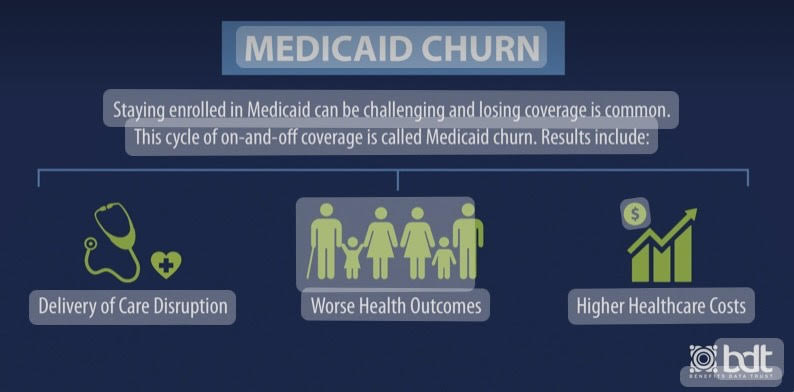By: Bushra Haque
The pandemic is finally seeming to come to an end. The majority of the nation is vaccinated and have received their booster, and increased vaccine access will continue to keep people protected against COVID-19.[1] However, we cannot celebrate too much just yet, because there is another health crisis on the horizon— millions of people are at risk of losing healthcare coverage.[2] During the pandemic, a federal mandate prohibited anyone enrolled in Medicaid from losing their healthcare coverage.[3] Enrollment in Medicaid services has reached record highs throughout the course of the pandemic, with about twenty-five percent of Americans being enrolled as of July of 2021.[4] The public health emergency is currently set to end later this week on April 16th.[5] Once this end arrives, Medicaid officials have to reevaluate the eligibility of those who are enrolled, and people risk losing their coverage if their income is found to be too high, or even if they fail to provide their states with the necessary income and residency verification.[6] What is even more horrifying is that people who do become unenrolled from Medicare may not even find this out until they have to next use their insurance, such as during a prescription pickup or clinic visit.[7]
Some people believe that current protections have already been in place for long enough.[8] They argue that the pandemic should not still be considered a health emergency after two years, and people’s circumstances have changed from the start of the pandemic to now, so not everyone that was initially eligible is or should still be considered to be eligible for Medicaid coverage.[9] But even if people are not on Medicaid themselves, can they still be affected by so many people potentially not being covered by health insurance anymore?
In short, yes. First, tens of thousands of preventable deaths can be attributed to lack of healthcare each year.[10] Uninsured individuals often experience reduced workforce participation and productivity, and their employers suffer due to them leaving work, missing work, or retiring early due to health reasons.[11] Lacking coverage causes individuals to inefficiently use the health system because they tend to resort to emergency room visits rather than being treated by a physician in earlier stages of illness.[12] Taxpayers have to finance government services created at federal, state, and local levels, such as public health clinics and safety net hospitals for uninsured individuals.[13] Finally, the untreated individuals with potentially contagious diseases may be all around due to being financially unable to get help, and when they do seek treatment at emergency rooms and hospitals, these facilities may experience being overwhelmed from not receiving adequate compensation, which makes it harder for them to treat others.[14]
So, in conclusion, the potential upcoming mass disenrollment of millions of Medicaid users should not just be a concern for those individuals, but the general public as well. One in four people in the country being a Medicaid user means almost everyone probably knows someone enrolled in these services. And if our community members lose their health care coverage, they will not be the only one facing consequences. On a broader scale, we will all face the costs of having uninsured community members in various ways. Thankfully, the U.S. Department of Health and Human Services has the ability to extend the public health emergency for another 90 days.[15] This would not be an automatic fix to the issue, but it could give a little more time to find a more effective, long-term solution. For the sake of public health, let’s hope this happens.
[1] US Coronavirus Vaccine Tracker, Usa Facts, https://usafacts.org/visualizations/covid-vaccine-tracker-states/.
[2] Rachana Pradhan, Why Millions on Medicaid are at Risk of Losing Coverage in the Months Ahead, Npr (Feb. 14, 2022, 11:11 AM), https://www.npr.org/sections/health-shots/2022/02/14/1080295015/why-millions-on-medicaid-are-at-risk-of-losing-coverage-in-the-months-ahead.
[3] Id.
[4] Id.
[5] Id.
[6] Id.
[7] Elizabeth Rosenthal, The End of the Covid Emergency Could Mean a Huge Loss of Health Insurance, Khn (Apr. 6, 2022), https://khn.org/news/article/the-end-of-the-covid-emergency-could-mean-a-huge-loss-of-health-insurance/.
[8] Supra note 2.
[9] Id.
[10] Karen Davis, The Costs and Consequences of Being Uninsured, The Commonwealth Fund (2003), https://www.commonwealthfund.org/sites/default/files/documents/___media_files_publications_in_the_literature_2003_jun_the_costs_and_consequences_of_being_uninsured_davis_consequences_itl_663_pdf.pdf.
[11] Id.
[12] Id.
[13] Id.
[14] Id.
[15] Supra note 2.
